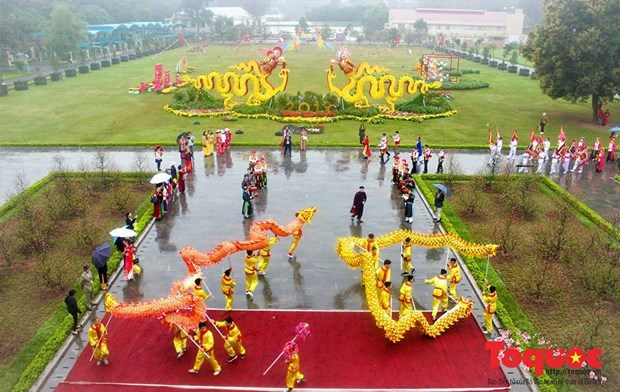 |
|
The atmosphere of the traditional Vietnamese Lunar New Year will be recreated at the Vietnamese Tet Programme 2020 at the Thang Long imperial citadel in Hanoi. (Photo: hanoimoi.com.vn)
|
The programme will begin with the “Ong Cong – Ong Tao” (Land Genie and KitchenGods) ceremony, which is followed by a wide range of traditional rituals suchas pole-erecting ceremony and incense offering ceremony.
Visitors to the event will have opportunities to experience traditional Tetthrough various activities like parallel sentence writing, to he toy making,water puppet performance, and chung cake making, among others.
Particularly, an exhibition at Kinh Thien Palace will give visitors a glimpseof the Ly, Tran, Le and Mac dynasties that reigned the nation throughout 1,300years.
Meanwhile, at the Temple of Literature, 52 calligraphers will participate inthe 2020 Spring Calligraphy Festival to honour the ancient art of writing.
The festival will also provide a space to introduce traditional handicrafts,ancient art forms like ca tru (ceremonial singing), chau van (ritual singing)and xam singing, and folk games.
Held by the Centre for Scientific and Cultural Activities of the Temple ofLiterature, the festival is expected to attract more than 100,000 visitorsduring January 18 – February 5./.VNA

Four guardian god temples of Thang Long-Hanoi
Thang Long’s four guardian god temples have vital locations in Hanoi. They were built as soon as King Ly Cong Uan established the country’s capital in Thang Long (now Hanoi).

Traces of Hung Kings’ culture in Thang Long-Hanoi
The first Hung King ruled Vietnam in 2879 BC. Cultural traces of the Hung King era, which ended in 258 BC, are still being discovered in the ruins of Vietnam’s former imperial citadel in Hanoi.
 The atmosphere of the traditional Vietnamese Lunar New Year will be recreated at the Vietnamese Tet Programme 2020 to be held at the Thang Long imperial citadel in Hanoi from January 17 to February 2.
The atmosphere of the traditional Vietnamese Lunar New Year will be recreated at the Vietnamese Tet Programme 2020 to be held at the Thang Long imperial citadel in Hanoi from January 17 to February 2.